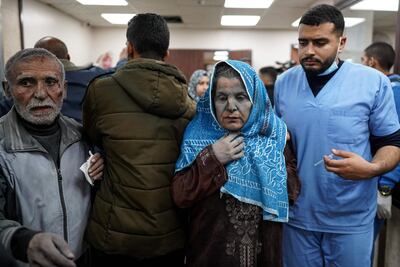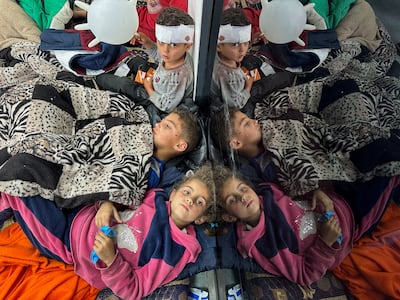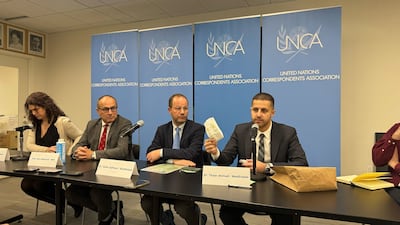Live updates: Follow the latest news on Israel-Gaza
A British surgeon who volunteered in a Gaza hospital early this year expressed serious concerns on Tuesday about the catastrophic impact of an Israeli military offensive in Rafah.
“If there's an invasion of Rafah, it'll be apocalyptic, the number of deaths we’re going to see” Prof Nick Maynard, a cancer surgeon at Oxford University Hospitals, who also teaches at the university, told reporters in New York following high-level meetings at the UN.
Israel’s offensive in Gaza has killed more than 31,900 people, displaced most of the enclave’s population of 2.3 million people and caused a hunger crisis.
The incursion was in response to Hamas attacks in southern Israel on October 7, in which about 1,200 people were killed and 240 abducted.
Prof Maynard said that after researching the meaning of genocide, he believes the situation in Gaza “fulfils every single definition” he has read.
“The endgame of the Israeli government is to force them out completely from Gaza to eradicate them from that land,” he said.
“I saw the most appalling atrocities and I saw things that I never would have expected to have seen in any healthcare setting.
“I saw things at Al Aqsa Hospital which I still wake up at night thinking about. Appalling injuries in, particularly, women and children. The most devastating burns in small children.
“One child that I'll never forget had burns so bad you could see her facial bones. We knew there was no chance of her surviving that but there was no morphine to give her.
“So not only was she inevitably going to die, but she would die in agony.”
He said the Israeli bombing of Gaza was widespread and indiscriminate, leading to the deaths of thousands of civilians.
The attacks, he added, were specifically aimed at hospitals, and intentionally demolished them “to make it almost impossible to provide anything resembling normal health care to the population of Gaza”.
Mr Maynard was last in Gaza in January with British charity Medical Aid for Palestinians.
When he returned, he met British Foreign Secretary David Cameron and Development Minister Andrew Mitchell to brief them on the situation in the enclave.
'250,000 people could die'
Dr Zaher Sahloul, president of the humanitarian charity MedGlobal, was also in Gaza in late January.
“If there is any offensive [in Rafah], they’re going to have a bloodbath, they’re going to have massacres after massacres,” Dr Sahlouf said in New York.
He estimates that 250,000 people will die directly and indirectly if the Israel-Hamas war escalates.
“We hope that it will not happen,” Dr Sahloul said.
Dr Amber Alayyan, a paediatrician and medical programme manager for Palestine with Doctors Without Borders, said hospitals in Gaza are operating on quota systems for drug supplies.
That leads to difficult decisions about which departments to fully stock as they try to treat seriously injured people flooding into the barely functioning Gazan hospitals.
“The infections are getting worse and worse,” Dr Alayyan said. “It's horrific for our providers, and it's absolutely horrific for these patients.
“We have seen patients who travelled – who were victims of explosive injuries, a family of 11, for example, a whole family that arrived to our hospital in the south from the north.
“They've been moving for three months looking for hospital care. They were victims of explosions. Eleven members of the family were burnt.
“The hospitals can't cope with the burden.”

Dr Thaer Ahmad, a Palestinian-American emergency medicine physician from Christ Medical Centre outside Chicago, who was also in Gaza in late January, said: “There's a war after the war and it's a day of reckoning for the people to think about everything that they've lost, all of the struggles that they've been through.
“And that's why I find it really cruel and unusual to talk about a Rafah offensive. People have been displaced multiple times.”
Dr Sahloul believes the only country that can “influence the situation” in Gaza is the US.
He said Gazans perceive a “double standard” in the international community's response to their crisis, compared to situations like the one in Ukraine and elsewhere.
“I think this, as an American, undermines our national security and interest in the region because we are losing the hearts and the minds,” Dr Sahloul said.
“And our moral leadership in the world is undermined by what we are not doing in Gaza.”
After their meetings at the UN, the four doctors are heading to Washington to meet US government officials and members of Congress.
“We need the bombs to stop dropping, hopefully through a ceasefire,” Dr Ahmad said.
Dr Sahloul added: “We're especially looking to meet Republican senators because I think that's more important than Democratic senators at this point.”



